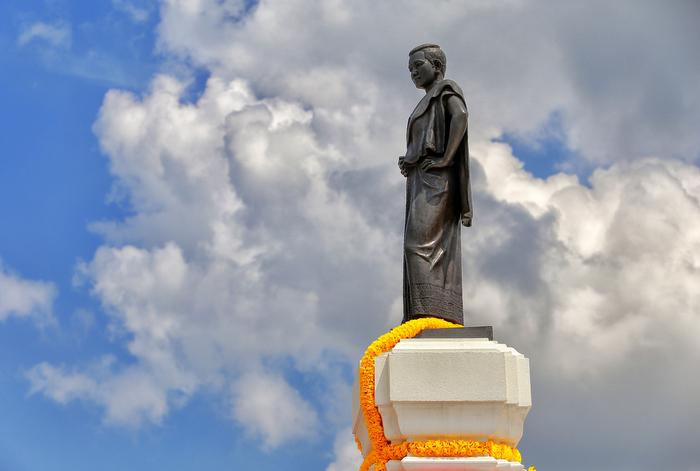Looking back: Thao Suranari – a great Thai heroine

PHUKET: Thao Suranari is one of the great heroines who left a mark in Thai history. Formerly known as Lady Mo, Thao Suranari was born in 1772, during the reign of King Taksin the Great. When she was 25, she married Thong Kam, who would later be elevated to deputy governor of Korat.
During the reign of King Rama II, a hill-tribe rebel, Ai-sa-kiet-gnong, claiming to possess magical powers, was quickly gaining thousands of militant followers. The rebels had joined him on the eastern side of the Mekhong River and were poised to attack Champasak, a Laotian city. During that time, Laos was a vassal state of Siam. The governor of Champasak, seeing that his troops were outnumbered, fled the city to save himself. The rebels, under Ai-sa-kiet-gnong, easily took Champasak and made it their stronghold.
In Vientiane, the Laotian capital, King Anuvong received news from Bangkok that the rebels had taken over Champasak. Anuvong was ordered to assemble his men and march on Champasak to liberate the city.
He ordered his son, Yo, to lead the Laotian forces to Champasak before Siamese reinforcements could arrive from Korat. Anuvong wanted to defeat the rebels before the Siamese could reach the city.
When they reached Champasak, they launched a ferocious assault. Ai-sa-kiet-gnong and his band of rebels could not withstand the siege for long and the city soon fell. Ai-sa-kiet-gnong was captured, bound in chains and sent to Bangkok. King Rama II was pleased, and made Yo the governor of Champasak.
After his death, King Rama II’s son, Prince Jetsadabhodin, was crowned King Rama III. At this time, King Anuvong decided to attack Saraburi, a Siamese town on the border of Laos in the year 1825. Anuvong ordered his second son, Gnow, to lay siege on Saraburi.
Gnow and his troops surrounded the city and convinced the governor to join forces with him against Siam. The governor of Saraburi agreed.
When King Anuvong heard this, he quickly marched his army to Saraburi. Over the next few months, Laotian forces under King Anuvong and his viceroy attacked Kalasin, Khemaraj, Roi-Et and Suvarna-bhumi. The governors of Kalasin and Khemaraj, refusing to side with the Laotians, were brutally executed. The governors of Roi-Et and Suvarnabhumi surrendered to Anuvong.
They next decided to conquer Korat. Unfortunately for the city, its governor and deputy governor were on a mission to Cambodia. Korat, it seemed, was leaderless.
Panic and fear began to spread when the enemy appeared at the gates. To make matters worse, most of the troops that could have fought the invaders had followed the governors to Cambodia. The city was down to its minimal defences.
When Anuvong reached Korat, he sent Gnow to meet with the city’s governor. Gnow was to try and convince the governor to join forces with the Laotians. If the governor did not cooperate, the Laotians threatened to launch an attack that very evening.
The people of Korat flocked to Lady Mo to discuss how best to defend the city. Lady Mo realized that Korat’s meager defences would be easily overrun if the Laotians decided to attack the city, so she devised an alternative plan.
Lady Mo rode out of the city to meet with Gnow. She told the invaders that Korat’s governors and defensive troops were on a mission to Cambodia and the city was filled with women, children and old people. Lady Mo told Gnow that Korat would surrender to the Laotians if they promised not to harm anyone. However, his advisors cautioned him that the Siamese governors might return at any time from Cambodia.
King Anuvong ordered his troops to move into Korat so they could use the city’s walls as defenses. Lady Mo allowed his troops to enter – she had little choice.
Lady Mo secretly sent word to Lord Thong Kam informing him of the surrender. Lord Thong Kam forwarded the news to Bangkok and asked the king for immediate assistance in liberating Korat and the other Siamese cities. That night, the governor, Lord Thong Kam and other nobles of Korat marched out of Cambodia and headed home.
When they arrived home, they realized the situation was a lot worse than they had imagined. King Anuvong commanded an army of ten thousand soldiers. Without reinforcements from Bangkok, it would be hard to defeat him.
To be continued…
— Anand Singh
Latest Thailand News
Follow The Thaiger on Google News:


























